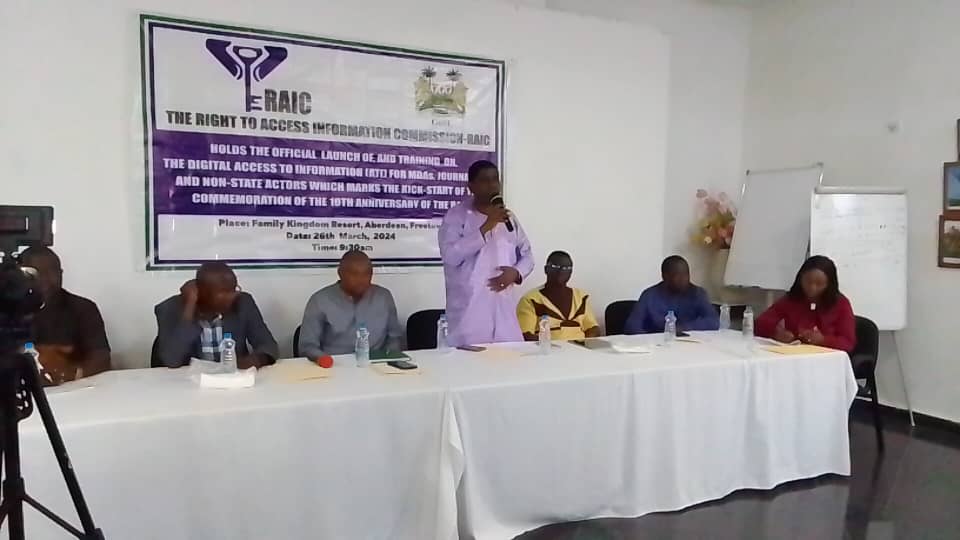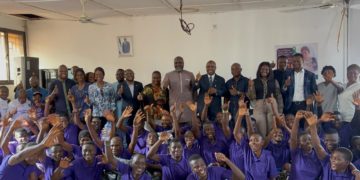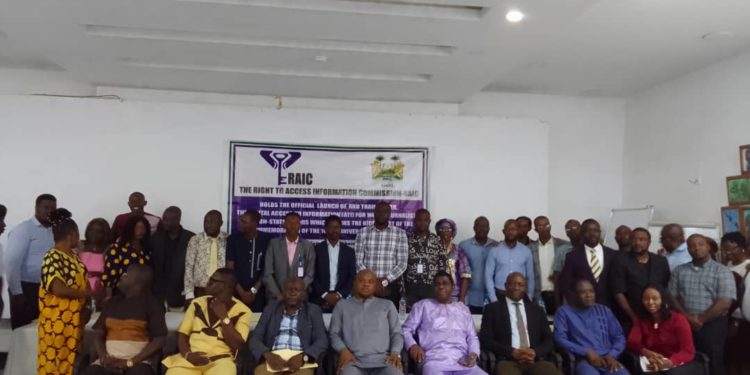By Mohamed Sahr
The Right to Access Information Commission (RAIC) has trained journalists, non-state actors and ministries, departments and agencies on the methods of requesting for information through their virtual platform.
The training conducted on Tuesday 26th March, is part of efforts by the Commission to enhance efficient and transparent access to information.
Tuesday’s training, according to the Commission, also offered the path to popularizing their updated digital platform.
Dr Ibrahim Seaga Shaw, Chairman of the RAIC, said that the whole idea of remodeling the digital platform and providing the knowledge to institutions and other players was to increase the flow of information to members of the public in a more cost saving manner. He noted that the new system would aid their monitoring and evaluation process and make easier the publication of their annual report.
Dr Shaw pointed out proactive disclosure of information by public officials is one of the ways that enhances the provision of multiple information with ease.
“We are going to ensure that MDAs are fully committed in cascading information to their functional websites,” he said in a statement during the opening ceremony of the event at the Family Kingdom Resort in Aberdeen, Freetown.

Shaw emphasized on the significance of running functional websites not only to the RAIC but also for MDAs, stressing that it requires the provision of information in sustainable digital systems.
According to the RAIC Chairman, freedom to access information platform is one of the four access blocks which provide options for MDAs, journalists and civil society organisations to adhere to their request whiles trying to access certain information. He noted that after a request form is completed and submitted, it takes 15 working days for monitoring and processing of the information to the requester.
He also highlighted another list of forms to be completed as part of the process, including the acknowledgement forms, response form and complaints form, which are mainly for public officials.
Bockarie Bawoh, Deputy Minister of Communication and Civic Education, acknowledged the role of the RAIC in the democratic process of Sierra Leone in respect of guaranteeing the right to access information by citizens. He therefore urged MDAs to embrace the available information systems.
“We seek the information that is timely and verifiable with this updated website,” Bawoh said.
Ben Foday, Direction of Corporate Affairs at the National Telecommunication Authority (NaTCA) also implored MDAs to work closely to ensure that they harmonize and improve connectivity for internet expansion.
Part of NaTCA’s mandate focuses on ensuring information is regulated to international standards. Mr Foday said efforts were ongoing to have rural connectivity increase to 80% by 2027 and urban broader access to increase to 95% by 2030.
Samuel Ansumana, Director of Communication and Public Relations at Statistics Sierra Leone, spoke on the shared value his institution and RAIC enjoy through provision of accurate electronic data to the people of Sierra Leone. He said Statistics Sierra Leone had a good response rate in terms of data request by MDAs.
“We received a total number of 63 requests, 58 requested information were given out, four pending cases and none of the data information were denied,” Mr Ansumana said.






















